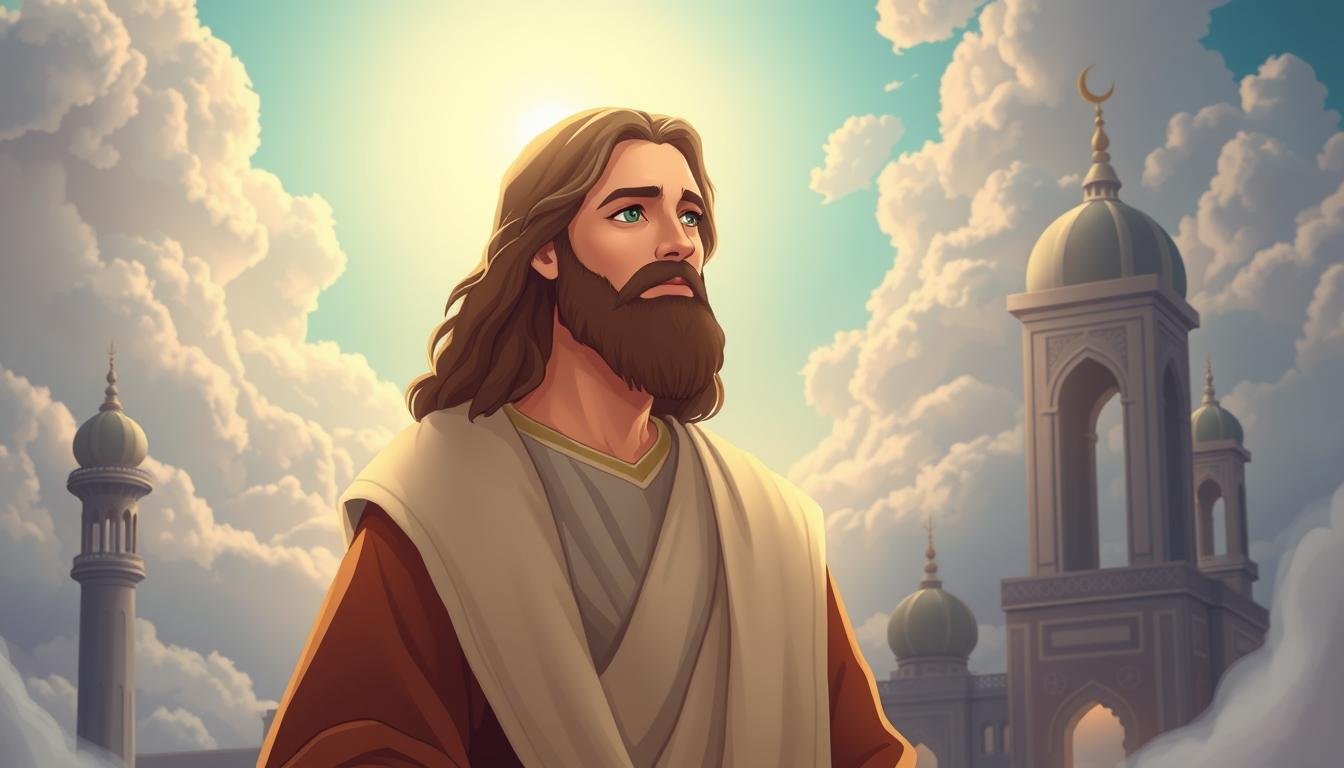What if everything you thought you knew about Jesus was only part of the story? In Islam, Jesus is known as Isa ibn Maryam. He is seen as the Messiah (al-Masih). Muslims believe he is a key prophet sent by God to guide the Children of Israel.
This article will look into how Muslims see Jesus. We will explore the Quran’s view of him and compare it to Christian beliefs.
In Islamic theology, Jesus’ birth and miracles are seen as miracles. His return to Earth is also important. But, Muslims and Christians disagree on his crucifixion and if he is divine.
By looking at the Quran and Jesus’ role as the Messiah, we can understand Islamic beliefs better. Are you ready to learn how Muslims view Jesus and what his messianic status means?
The Islamic Perspective on Jesus
The Islamic view of Jesus is very important. Jesus, or ‘Isa in Arabic, is named 25 times in the Quran. He is called al-Masih, or the Messiah. He is seen as a prophet who brought divine guidance to the Children of Israel through the Injīl, or Gospel.
Jesus is respected for his miracles, like curing the blind and healing lepers. These miracles show he was a healer and spiritual guide. The Quran says Jesus was not crucified but was raised up by God. This makes the Islamic view of Jesus different from Christianity.
Muslims see Jesus as a prophet, alongside Abraham, Moses, and Muhammad. His birth, announced by angels to Maryam (Mary), is seen as miraculous. Islamic texts also celebrate Jesus as a spiritual leader who will return at the end of days.
Understanding the Term ‘Messiah’
The term ‘Messiah’ means different things in different religions. In Islam, it’s called ‘al-Masih.’ It refers to a special person chosen by God to guide and help people. This person is believed to do miracles.
In Islam, the Messiah is about fairness and justice. Muslims see Jesus as a prophet, not a god. They believe Jesus was not crucified, unlike what Christians believe.
Looking at the Messiah in different religions shows a lot of beliefs. Jews, Christians, and Muslims all have their own views. Jews wait for a Messiah to save Israel. Christians think Jesus was the Messiah. Muslims respect Jesus but look forward to the Mahdi.
Do Muslims Believe Jesus Is The Messiah?
In Islam, Jesus is seen as al-Masih or the Messiah. The Quran talks about Jesus a lot, showing his importance. It talks about him about twenty-five times.
This shows Jesus is key in Islam. It helps us understand his role as a messenger of Allah. This leads to talks about the differences between Islamic and Christian views.
Quranic References to Jesus as Al-Masih
The Quran calls Jesus al-Masih in many places. It says he was a guide to the Israelites. Surah 3:44 calls him the “Messiah, Jesus, son of Mary.”
It says Jesus did miracles and was born of the virgin Mary. He is honored in this world and the next. But Muslims don’t think Jesus is God, because they believe in one God only.
Differences in Interpretation between Islam and Christianity
Christians believe Jesus is the Messiah and the Son of God. They see him as part of a divine trinity. Muslims see Jesus as a prophet who taught to follow one God.
They don’t believe in Jesus’ crucifixion and resurrection. The Quran says Jesus was taken to heaven before he died. These differences show how Jesus is seen differently in Islam and Christianity.
The Role of Jesus in Islamic Theology
In Islamic theology, Jesus is a key figure. He stands for morality, ethics, and a divine purpose. He is seen as one of the five major prophets, known for his determination.
The Quran highlights his humanity and devotion to God. This sets him apart from the Christian view of Jesus as the Son of God.
Jesus’ teachings lead followers to justice, compassion, and worship of one God. He teaches to submit to God’s will, showing the heart of Islam. His message guides believers on the ‘straight path’ and promotes a moral society.
Islamic scholars see Jesus’ miracles as proof of his importance. They show his role in sharing God’s teachings and inspiring believers.

Muslims highly value Jesus, seeing him as the Messiah. This title shows his anointed nature in Islam. It highlights his role in the spiritual world of Islam.
Discussing Jesus’ role helps understand shared beliefs. This is key for interfaith harmony and respect.
Jesus’ Birth and Virgin Mother
The story of Jesus’ birth is important in both Islam and Christianity. In Islam, the Virgin birth is very respected. It shows how much Mary is valued as a holy person. This respect is shared by both faiths, leading to deeper talks about her spiritual role, especially in the Quran.
Quranic Accounts of Mary (Maryam)
Mary is the only woman named in the Quran. This shows her high status in Islamic beliefs. The Quran has a whole chapter about her, focusing on her purity and goodness.
In Surah 19, also known as Maryam, the Quran tells us about her miraculous pregnancy and birth of Jesus. It calls her a very righteous woman, chosen and purified by God. This story, while similar to some Christian texts, gives us a unique look at Mary in Islam. It makes her a key figure in religious history.
Miracles Associated with Jesus in Islam
The Quran talks about Jesus’ miracles as signs of God’s power. It says Jesus healed the sick and brought people back to life. These miracles show Jesus’ special connection with God.
They also serve as symbols in Islamic teachings, showing Jesus’ role in divine intervention. The respect for Jesus and Mary in Islam helps with talks between Muslims and Christians. It makes their shared religious stories richer.
Jesus’ Life and Mission as Described in the Quran
The Quran tells a different story of Jesus than the New Testament. Both agree Jesus was a prophet, but the Quran focuses more on his teachings. It doesn’t mention his crucifixion and resurrection.
Comparison with Christian Accounts
The Quran says Jesus wasn’t crucified, unlike Christian beliefs. This leads Muslims to believe Jesus was taken up to heaven. They see him as a respected prophet, a teacher and messenger of God.
While Christians see Jesus’ death as key to salvation, the Quran sees his life as a guide. It says the Torah and Gospel are divine, but parts may have been changed. This could lead to wrong ideas about Jesus.
Jesus’ story in the Quran and Christianity shows a deep connection between faiths. Scholars and theologians discuss Jesus’ teachings and how they’re seen in each faith. They explore how Jesus’ legacy affects personal, social, and political identity.
The Concept of Eschatology in Islam
Islamic eschatology looks at the end times and Judgment Day. It talks about important figures in the final events. Jesus’ return is seen as key in bringing justice and righteousness.
The Quran says Jesus is a “sign for all people.” This shows his big role in the end times. His return is tied to many signs before Judgment Day. The rise of false figures, like Al-Masih ad-Dajjal, is also important.
Hadiths tell us about Jesus’ return and what he will do. He will end false beliefs and practices. His coming is a major sign of the end, linking Islamic eschatology with Jesus’ return.
Islamic and Christian views on Jesus sometimes differ. But in Islam, Jesus’ return is about justice and monotheism. The stories say Jesus will fight evil, bringing peace and righteousness to all.
Jesus’ Presence in Islamic Eschatology
In Islamic eschatology, Jesus’ return is very important. It’s believed he will come at the end of days to fight the false messiah, Al-Masih ad-Dajjal. This shows God’s promises will come true, bringing truth and justice to Earth.
Jesus’ return is a key moment in the Islamic end times story.
Return of Jesus at the End of Days
The return of Jesus is a big deal in Islam. It shows his important role in the end times. His coming means justice and righteousness will win over evil.
This event ties into bigger themes of redemption and truth’s victory, as the Qur’an teaches.

Jesus and Al-Masih ad-Dajjal (The False Messiah)
Al-Masih ad-Dajjal is a bad guy who tries to trick people. Islamic stories say Jesus will fight and beat him. This shows Jesus’ special role in the end times.
His fight against Al-Masih ad-Dajjal shows his divine power. It’s more than just being a prophet. It’s about truth vs. lies, as Islamic theology teaches.
The Importance of Tawhid in Jesus’ Teachings
Tawhid means believing in one God. It’s key in Islam and Jesus’ teachings. Jesus, or Isa, was a messenger who taught strict monotheism. Muslims see him as a prophet, not divine, unlike in Christianity.
This shows how important Tawhid is in Islam. It’s about believing there is only one God, Allah.
In the Quran, Jesus is praised for teaching monotheism. He told his followers to worship only Allah. This shows the unity of God is crucial.
Other prophets also taught this unity. The Quran talks about Jesus’ miracles. These miracles show his role as a messenger and the importance of believing in one God.
Tawhid and Jesus’ teachings show both similarities and differences between Islam and Christianity. Muslims believe in God’s oneness and value respect and dialogue with Christians. Both faiths teach about worship, justice, and morality.
Interactions and Common Ground between Islam and Christianity
Looking at how Islam and Christianity interact shows they share a lot. They both see Jesus as a prophet. This belief is key for talking and understanding each other better.
Islam sees Jesus as one of God’s main messengers, along with Moses and Muhammad. Muslims respect Jesus but don’t agree with his being divine. They also don’t believe in his death or resurrection.
Recognizing Jesus as a Prophet
Seeing Jesus as a prophet helps both faiths respect each other. In Christianity, Jesus is more than a prophet. He is the Messiah and shows God’s love through his teachings.
The Gospel of John says Jesus is the Logos, showing God’s nature. But Islam sees Jesus as a human, important in God’s message.
Both faiths value Jesus’ teachings. This makes talking and understanding each other easier. By focusing on what they agree on, they can grow closer.
Muslims’ View on the Divinity of Jesus
Muslims do not believe Jesus is divine. They see him as a respected prophet and messenger. The Quran teaches that God is one and alone, with no partners.
They believe the Bible writers saw Jesus as a man, not God. Matthew, Mark, and Luke wrote about Jesus as a human. Paul also believed Jesus was not God. The disciples didn’t call Jesus God for thirty years after he went up to heaven.
“Peter described Jesus as a man accredited by God,” illustrating that even among Jesus’ closest followers, the notion of divinity was absent.
The Gospels show Jesus had human limits. He couldn’t do miracles in his hometown and didn’t know when the last day would come. This shows he was not divine. Luke’s Gospel and the Book of Hebrews say Jesus learned and didn’t know everything, unlike God.
Muslims read the Gospel of Jesus to please God. But the phrase “Son of God” makes them feel uneasy. It can make them angry or even reject the Gospel. Many see it as against God’s unity.
Muslims respect Jesus as the last prophet before the Second Coming. They believe he will face the False Messiah. But they see his life and mission as human, not divine. This view is key to Islamic theology.
For more on Islam and Jesus, check out this resource.
Jesus in Sufism and Islamic Mysticism
In Sufism, Jesus is seen as a key spiritual leader. He shows perfect submission to God’s will. His life is a symbol of deep love, compassion, and divine connection.
Sufi poets like Jalaluddin Rumi and Fariduddin Attar have written about Jesus. They focus on his purity and healing. They also link his teachings to broader mystical ideas.
The Qur’an talks about Jesus twenty-five times. He is called ‘Ibn Maryam’ or “the son of Mary.” His title ‘al-Masih’ (the Messiah) is mentioned eleven times.
While Muslims see Jesus as a major prophet, they don’t believe he is divine or was crucified. They see him as a key figure in their faith. The Sufi Jesus shows the longing for God and how his image goes beyond simple beliefs.
Sufism is all about love and connection, with Jesus as a bridge to the divine. Figures like Muhyeddin ibn al-‘Arabi have written about Jesus’ transformative power. They show how love and divinity are connected through him.
This view of Jesus encourages people to think about their spiritual paths. It shows Jesus’ importance in the search for enlightenment and divine love in Islamic mysticism.
FAQ
Do Muslims believe Jesus is the Messiah?
What is the Islamic perspective on Jesus?
How does Islam interpret the term ‘Messiah’?
What Quranic references support Jesus being referred to as al-Masih?
What are the primary differences between Islamic and Christian interpretations of Jesus?
What role does Jesus play in Islamic theology?
What does the Quran say about Mary, the mother of Jesus?
What miracles are associated with Jesus in Islam?
How does the Quran depict Jesus’ life and mission compared to the New Testament?
What is the significance of eschatology in Islam regarding Jesus?
What does Islamic teaching say about the return of Jesus?
How does Tawhid relate to the teachings of Jesus?
How do Islam and Christianity find common ground concerning Jesus?
What do Muslims believe regarding the divinity of Jesus?
What is Jesus’ significance in Sufism?

Embracing Faith, One Insight at a Time!
The teachings of the Quran have always guided my path. With a deep passion for Islamic knowledge, I strive to blend the wisdom of tradition with the relevance of today, making the timeless messages of Islam accessible and meaningful for everyone.
Muslim Culture Hub is my platform to share historical insights and thought-provoking articles, exploring both well-known and lesser-discussed aspects of Islamic culture and beliefs. My mission is to create an inclusive online space where everyone can learn, strengthen their faith, and connect with the profound message of Islam.
Join the journey!
May peace be upon you.








